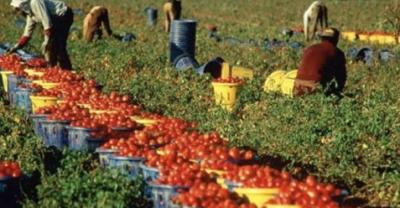UK and Italy unite against modern slavery

ROME - Modern slavery is not caused principally by illegal immigration but is the product of flawed economic systems in Italy and other European countries, Roberto Iovino, a senior Italian trades unionist, told a joint UK-Italy conference on exploitation by Gangmasters held at the Villa Wolkonsky, the British Ambassador Jill Morris's residence, this week.
"Illegal immigration is not a cause of modern slavery," Iovino, from the FLAI-CGIL trade union, told delegates Wednesday, praising the UK's multi-organisational approach to fighting organised crime.
“Safeguard of victims doesn’t work," he added, "we cannot convince labourers to collaborate when they are under the threat of the Gangmasters.” The Italian Department for Equal Opportunities tried to amend this with Articles 18 and 22, which aim to protect workers from wrongful dismissal. This works on paper, according to Iovino, but not in practice. People need to work.
“The proceeds from the confiscation of the gangmasters’ property must be spent on compensation for the workers,” he said.
Nevertheless Giovanni Abbate from the IOM (International Organisation for Migration), for his part, argued that while as many as 500, 000 refugees arriving in Europe every year may not be the main cause of modern slavery the phenomenon must certainly be taken into consideration. He underlined the example of the region of Apulia as a model, which houses a “forced labour” counter. There are several agricultural projects near Foggia, such as a farm which was donated to make “exit mechanisms” possible, and abandoned buildings which could be used by the workers.
“According to the Global Slavery Index,” said the Ambassador in her speech, “45 million people are victims of modern slavery, often run by criminal organisations”. She referred to recent steps that have been taken, such as the October 2016 law in Italy which gave the authorities more power: it simplifies the definition of caporalato (modern slavery), allows employers to be penalised, ensures mitigating circumstances if there is collaboration with the police, requires obligatory arrest when a crime has been committed, and even the confiscation of property in some cases. Ms Morris continued by saying that the UK and Italy had to work together to rebuild the workers’ freedom.
Maria Grazia Giammarinaro, Magistrate and the UN’S Special Rapporteur on trafficking in persons, emphasised the UK and Italy’s roles in the struggle against modern slavery by highlighting that they were two of the most active countries in this area. “We must learn from each other, and use each other’s experiences.” Although steps have been taken against this form of repression, there are still big questions which need to be answered: “What happens to the victims? What can we do to empower the workers?”
Qiraat Cunningham, the Vice President of International Policy in the Unit against Modern Slavery from the British Home Office outlined the UK’s approach to the problem, mentioning Theresa May’s 2015 Modern Slavery Act, and their method of minimising slavery crime: “Pursue, Prevent, Protect, Prepare”.
Pam Bowen, from the British Crown Prosecution Service spoke of the difficulties of victims testifying in court, due to their high levels of vulnerability. Therefore, court cases cannot be dependant on victims’ testimonies. These challenges are met with “pro-active investigation, covert techniques, surveillance” as well as, on a more international level, “joint investigations with Europol and Eurojust”.
Also representing the UK was Darryl Dixon, from GLAA (Gangmasters Labour Abuse Authority). This government inspectorate is designed to tackled forced labour and has police powers. Dixon met Giammarinaro in 2012, when she represented the OSCE (Organization for Security and Co-operation in Europe) and compiled a report on GLAA, recommending that they should be given more remit. The organisation has grown and can inspect businesses, working and behaviour conditions, workers’ accommodation, and arrest individuals. It is, however, restricted to the agricultural sector only.
The Italian speakers echoed several of the UK representatives’ points, although it was clear that the problem took a new dimension when applied to Italy: migrants and mafia organisations, especially in the South of the peninsula, became protagonists in the debate.
Danilo Papa, from the Italian Labour Inspectorate, emphasised the areas at high risk of modern slavery such as Bari, Caserta, Lecce, and Reggio Calabria. He highlighted the need for action rather than just “parlare dell’aria fritta”, (speaking a load of hot air), and said that the agricultural sector was often mentioned, but that the conversation needed to be widened to other sectors: modern slavery can happen in fields but also in administration or big cooperations.
Colonel Nicodemo Macri’, The Carabinieri Commander for Workplace Protection, explained how the police are operating against modern slavery on a daily basis. Since January 1 2017, there are 5 “nuclei” in Italy: Milan, Venice, Rome, Naples and Palermo. Macri’ also presented the rise in finding culprits: between November 4 2016 and June 30 2017, the Italian police were able to arrest 12 individuals, compared with two arrested in the whole of 2015.
The discussion showed the strength of the UK and Italy working together. Despite different legal systems and organisations, the goal remains the same - to abolish modern slavery. Speakers were unanimous when it came to redesigning victim protection so that complying with the law and testifying felt safer and opening the debate to more than just agriculture. Ultimately, this is a global problem which requires a global response.


